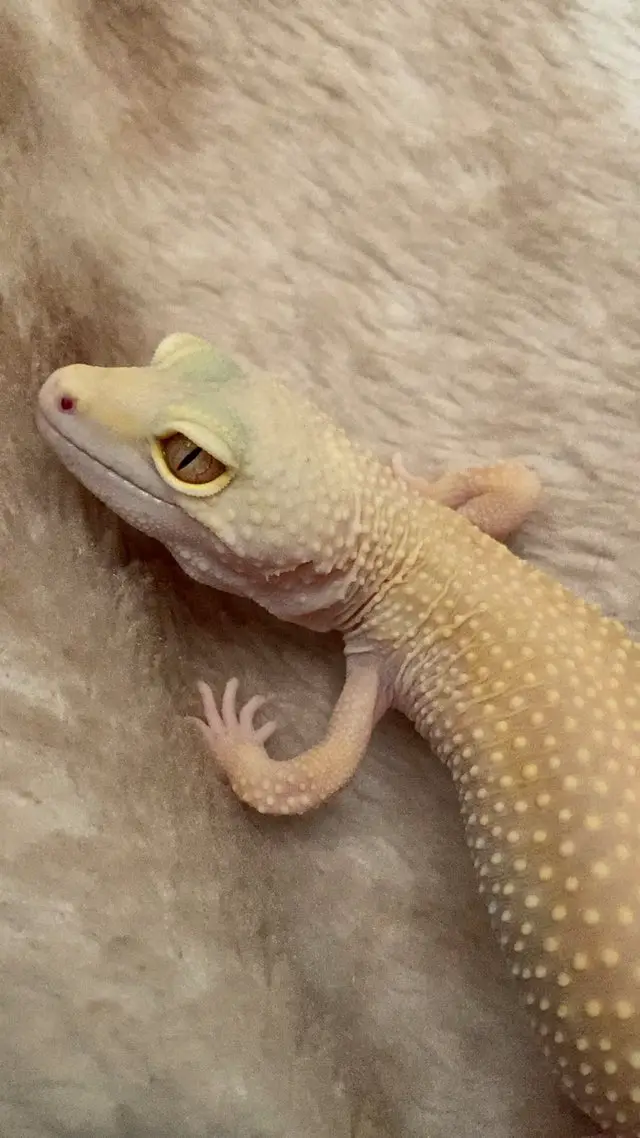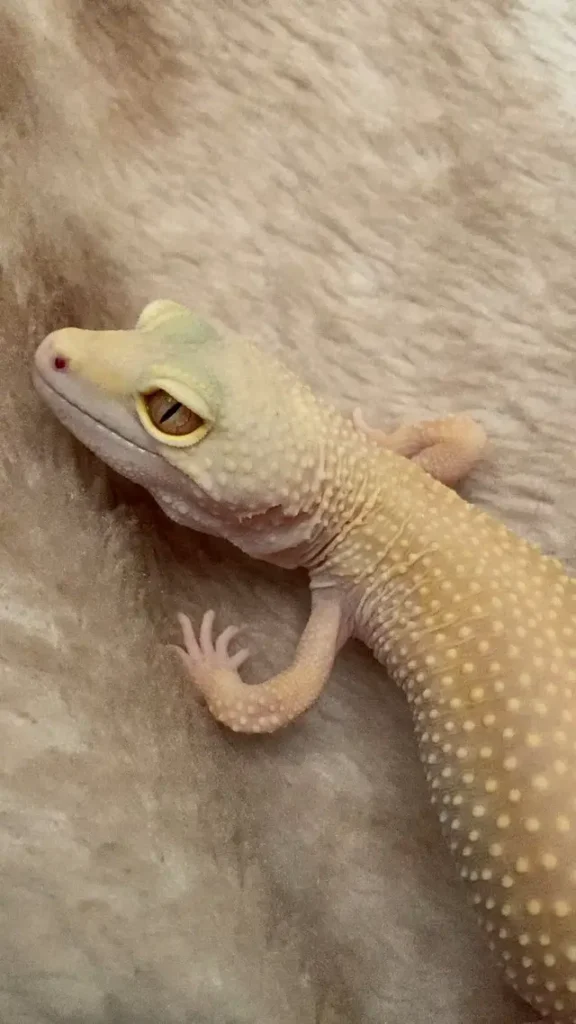If you are a leopard gecko owner, you may have noticed your pet breathing fast. This can be a cause for concern, as it may indicate an underlying health issue. In this article, we will explore the common reasons why leopard geckos breathe fast and what you can do to help them.
From stress to respiratory infections, there are several factors that can affect your leopard gecko’s breathing. By understanding the causes of rapid breathing, you can take the necessary steps to ensure your pet’s health and well-being. So, let’s dive in and learn more about why your leopard gecko may be breathing fast.

Why is My Leopard Gecko Breathing Fast?
Leopard geckos are known for their calm and laid-back demeanor, making them a popular choice as a pet. However, as a responsible pet owner, it is important to be aware of your leopard gecko’s behavior and health. One issue that may arise is when you notice your leopard gecko breathing fast. In this article, we will explore the possible reasons why your leopard gecko may be breathing rapidly.
Stress
Stress is one of the most common reasons why leopard geckos may breathe fast. This can be caused by various factors such as a change in their environment, handling, or even the presence of other animals in their surroundings. When a leopard gecko is stressed, it may also display other symptoms such as loss of appetite, lethargy, and hiding.
To reduce stress levels in your leopard gecko, make sure to provide a comfortable and secure environment with proper lighting, temperature, and humidity levels. Avoid sudden changes in their environment and limit their exposure to loud noises or excessive handling. If you have multiple leopard geckos, make sure to provide enough space for each one to prevent competition and aggression.
Respiratory Infection
Another possible reason for fast breathing in leopard geckos is a respiratory infection. This can be caused by bacteria or viruses that affect the lungs and airways, leading to symptoms such as wheezing, coughing, and rapid breathing. Other signs of a respiratory infection may include mucus around the nose and mouth, and a decreased appetite.
If you suspect that your leopard gecko may have a respiratory infection, it is important to seek veterinary care immediately. Your veterinarian may prescribe antibiotics or other medications to treat the infection and prevent it from spreading to other animals in your household.
Overheating
Leopard geckos are cold-blooded animals and require a specific temperature range to maintain their health. If the temperature in their enclosure is too high, your leopard gecko may breathe rapidly as a way to cool down. Other signs of overheating may include lethargy, loss of appetite, and a lack of interest in their surroundings.
To prevent overheating, make sure to provide a temperature gradient in their enclosure with a warm and cool side. Use a thermometer to monitor the temperature and adjust the heating source if necessary. Avoid placing their enclosure in direct sunlight or near heat sources such as radiators or air conditioning units.
Dehydration
Leopard geckos require access to clean water at all times to stay hydrated. If your leopard gecko is dehydrated, it may breathe rapidly as a way to compensate for the lack of moisture in their body. Other signs of dehydration may include sunken eyes, wrinkled skin, and lethargy.
To prevent dehydration, make sure to provide a shallow water dish in their enclosure and change the water daily. You can also mist their enclosure with water to increase humidity levels and provide a moist hiding spot. If you suspect that your leopard gecko may be dehydrated, you can offer them water through a syringe or dropper.
Internal Parasites
Leopard geckos may also breathe rapidly if they have internal parasites such as worms or protozoa. These parasites can affect their digestive system and lead to symptoms such as diarrhea, weight loss, and a decreased appetite. Other signs of internal parasites may include lethargy and a lack of interest in their surroundings.
To prevent internal parasites, make sure to keep their enclosure clean and provide a balanced diet with proper supplementation. You can also have your leopard gecko tested for parasites by a veterinarian and treat them accordingly.
Benefits of a Healthy Leopard Gecko
Keeping your leopard gecko healthy is important not only for their well-being but also for your enjoyment as a pet owner. A healthy leopard gecko will display a calm and relaxed behavior, have a good appetite, and be active during their active hours. Providing a clean and comfortable environment with proper nutrition and hydration will help maintain their health and prevent potential health issues.
Conclusion
In conclusion, there are various reasons why your leopard gecko may be breathing fast, ranging from stress to internal parasites. It is important to observe their behavior and seek veterinary care if necessary. Providing a comfortable and secure environment with proper nutrition and hydration will help maintain their health and prevent potential health issues in the future.
Frequently Asked Questions
Leopard geckos are fascinating reptiles that can make great pets. If you’ve noticed your leopard gecko breathing fast, you may be wondering what’s going on. Here are some common questions and answers about why your leopard gecko may be breathing fast.
What could be causing my leopard gecko to breathe fast?
There are a few reasons your leopard gecko may be breathing fast. One possibility is that they are too hot. Leopard geckos need a warm environment, but if it’s too hot, they may start breathing fast as a way to cool down. Another possibility is that they are stressed or scared. Loud noises, sudden movements, or being handled too much can all stress out your gecko and cause them to breathe fast.
If your leopard gecko is breathing fast and you’re not sure why, it’s important to take them to a veterinarian who specializes in reptiles. They can help determine the cause of your gecko’s fast breathing and provide treatment if necessary.
What should I do if my leopard gecko is breathing fast?
If you notice your leopard gecko breathing fast, it’s important to monitor them closely. Make sure they have a cool place to rest and plenty of water. If the fast breathing continues for more than a few hours, or if your gecko seems lethargic or has other symptoms, take them to a veterinarian who specializes in reptiles.
It’s also important to make sure your leopard gecko’s environment is appropriate. Check the temperature and humidity levels, and make sure they have plenty of hiding places and things to climb on. A stressed or uncomfortable gecko may start breathing fast as a way to communicate their discomfort.
Can a respiratory infection cause my leopard gecko to breathe fast?
Yes, a respiratory infection can cause your leopard gecko to breathe fast. Respiratory infections are common in reptiles and can be caused by bacteria, viruses, or fungi. Symptoms of a respiratory infection include fast breathing, wheezing, lack of appetite, and lethargy.
If you suspect your leopard gecko has a respiratory infection, take them to a veterinarian who specializes in reptiles as soon as possible. Treatment may include antibiotics or antifungal medication, as well as supportive care such as fluids and heat therapy.
How can I prevent my leopard gecko from breathing fast?
The best way to prevent your leopard gecko from breathing fast is to provide them with a comfortable, stress-free environment. Make sure their enclosure is the right temperature and humidity, and provide plenty of hiding places and things to climb on. Avoid handling your gecko too much, and be gentle when you do handle them.
If your leopard gecko does start breathing fast, monitor them closely and take them to a veterinarian if necessary. Early intervention can help prevent serious health problems and ensure your gecko stays healthy and happy.
Is fast breathing always a sign of a health problem?
No, fast breathing isn’t always a sign of a health problem. Leopard geckos may breathe fast as a way to regulate their body temperature or as a response to stress. However, if your gecko’s fast breathing is accompanied by other symptoms such as lethargy, lack of appetite, or wheezing, it could indicate a health problem.
If you’re not sure why your leopard gecko is breathing fast, it’s always a good idea to take them to a veterinarian who specializes in reptiles. They can help determine the cause of your gecko’s fast breathing and provide treatment if necessary.
Sick leopard gecko? | Signs of an unhealthy leopard gecko
In conclusion, understanding why your leopard gecko is breathing fast is crucial in ensuring its health and well-being. Rapid breathing can be a sign of stress, respiratory infection, or even overheating. By observing your pet’s behavior and environment, you can determine the cause of its rapid breathing and take appropriate action.
If you suspect that your leopard gecko’s fast breathing is due to stress, make sure its living conditions are suitable. A comfortable and safe habitat, with proper temperature, humidity, and lighting, can go a long way in reducing stress. Additionally, avoid handling your gecko excessively, as this can also cause stress.
If respiratory infection is the cause of rapid breathing, seek veterinary care immediately. This can involve administering antibiotics or other medications, as well as isolating the gecko from other pets to prevent the spread of infection. Timely intervention can prevent the infection from worsening and causing further health issues.
Overall, being attentive to your leopard gecko’s behavior and health is essential in ensuring its well-being. By taking proactive measures to address rapid breathing, you can maintain a healthy and happy pet for years to come.


